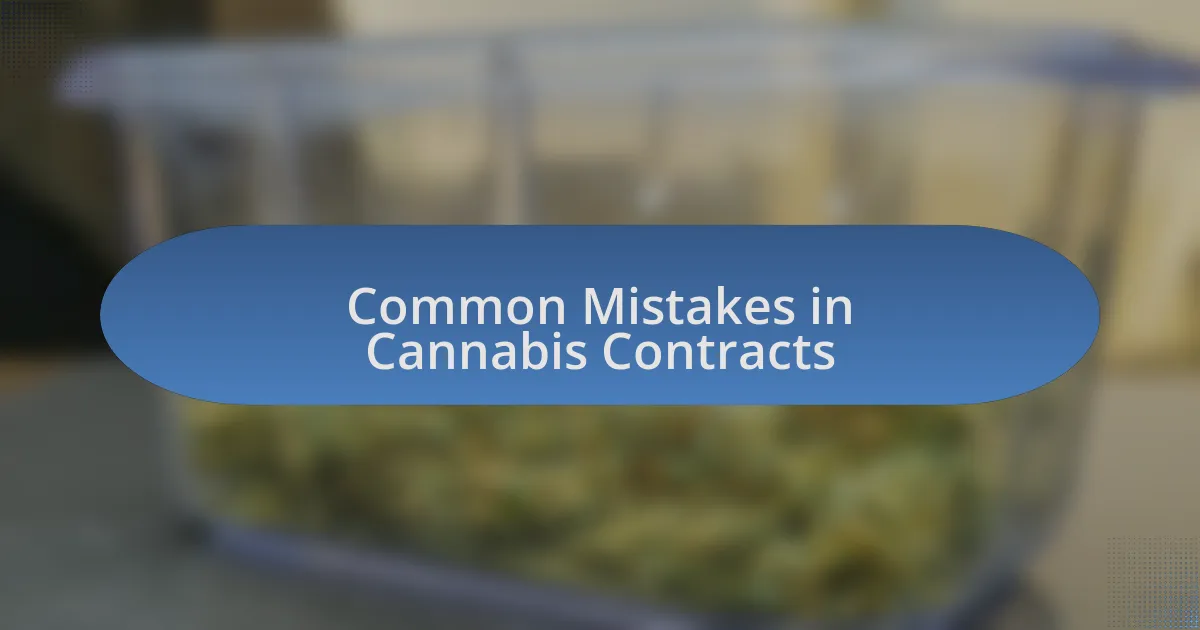Key takeaways:
- Clear communication and detailed terms in cannabis contracts are crucial to avoid misunderstandings and disputes.
- Compliance with local laws and regulations must be prioritized to safeguard businesses from legal challenges.
- Including conflict resolution and termination clauses in contracts can protect interests and facilitate smoother transitions.
- Safeguarding intellectual property and establishing clear financial expectations build trust and accountability among partners.

Introduction to Cannabis Contracts
Navigating the world of cannabis contracts can feel overwhelming at first. I remember my initial experience with these agreements; I was filled with uncertainty about the legal jargon that seemed designed to confuse. It made me wonder: how could an industry focused on relaxation and well-being be so intricate?
Contracts in the cannabis sector are essential for setting clear expectations and protecting all parties involved. In my experience, a well-crafted cannabis contract can be a game-changer, ensuring everything from payment terms to product quality is specified. Have you ever entered into an agreement without fully understanding the terms? It can lead to misunderstandings and conflicts that are easily avoidable with proper documentation.
These agreements aren’t just about the legalities; they’re about fostering trust and collaboration in a rapidly evolving industry. For me, each contract represents more than a legal obligation; it’s a foundation for the relationships I build with partners and clients. As the cannabis market grows, understanding the nuances of these contracts becomes increasingly important—are you ready to explore this essential aspect more deeply?

Importance of Cannabis Contracts
When it comes to cannabis contracts, their importance cannot be overstated. I recall a situation where a missed detail in an agreement led to a significant delay in a product launch. That experience taught me that contracts are vital for outlining responsibilities and timelines. Without such clarity, chaos can easily ensue, affecting not only finances but also reputations.
In this ever-changing industry, compliance with regulations often hinges on the specifics laid out in contracts. I’ve seen firsthand how the wrong wording can lead to legal challenges. Trust me, nothing feels worse than dealing with a dispute that could have been avoided with a thorough review of the contract terms. Have you ever faced a compliance issue? It can feel like a heavy weight on your shoulders.
These contracts serve as a protective barrier, ensuring that all parties are accountable. I remember a partnership where having a detailed agreement allowed us to collaborate more freely, knowing we were legally safeguarded. It empowers everyone involved to focus on building the business instead of worrying about potential fallout. Isn’t it comforting to know that a well-drafted contract can be your safety net in the cannabis world?

Key Elements of Effective Contracts
One key element in effective cannabis contracts is clarity in terms and definitions. I recall an instance where I worked on a supply agreement, and ambiguous terms led to misunderstandings between parties. The word “delivery,” for example, can mean different things to different people; specifying whether it referred to the delivery date or the method of transportation made all the difference in avoiding conflicts.
Another crucial aspect is outlining responsibilities and obligations clearly. In one of my early partnerships, we detailed every task expected from each party in the contract. This not only set clear expectations but also minimized the chance of assumptions leading to disputes. It’s quite a relief to look back and know that everyone involved understood their roles; it kept the project moving smoothly and fostered a sense of trust.
Finally, including a conflict resolution clause is vital. During a challenging negotiation, I learned how important it is to outline how disputes will be addressed. Whether it’s mediation, arbitration, or another method, having this in writing prepares all parties for potential issues and instills a sense of security. Have you ever been stuck in a disagreement without a way to resolve it? Knowing there’s a plan can make all the difference in maintaining business relationships.

Common Mistakes in Cannabis Contracts
One common mistake I often see in cannabis contracts is overlooking compliance with local laws and regulations. In a previous project, I was involved in a contract that failed to acknowledge changing state laws regarding licensing. As a result, we faced unexpected legal challenges that not only delayed the project but also increased our costs. Have you ever navigated a situation where a simple oversight led to significant complications?
Another pitfall is neglecting detailed payment terms. I once entered a partnership where the payment structure was vaguely written, leading to confusion over when invoices were due. Trust me, nothing disrupts a working relationship like a misunderstanding about money. Clearly stating payment schedules and methods might seem tedious, but it pays off in the long run by sparing parties from unnecessary disputes.
Many contracts also lack a solid exit strategy. I remember a time when a friend was stuck in a long-term agreement that was no longer beneficial. Without a defined exit plan, he felt trapped and frustrated. Have you ever found yourself in a similar situation? Including clear terms for termination can protect all parties and provide a sense of freedom to adapt as business needs change.

Personal Experiences with Cannabis Contracts
When it comes to crafting cannabis contracts, I’ve learned the value of clarity through some hard lessons. In one instance, I was part of a joint venture where ownership percentages were not explicitly defined. This ambiguity caused tension down the line when decisions needed to be made, and emotions ran high. I often ask myself: how different could it have been if we had laid everything out from the start?
I’ve also experienced firsthand the importance of addressing dispute resolution within contracts. Early on, I overlooked this detail in an agreement, thinking it was unnecessary. However, after a disagreement arose, we were left grappling with how to resolve issues without a clear framework. Involving a mediator might seem like an extra step, but it can save a lot of headaches later on. Have you ever thought about how a simple clause can change the dynamics of a partnership?
In my journey through cannabis contracts, I’ve found that personal relationships heavily influence negotiation outcomes. I recall negotiating with a close friend, and while we both assumed mutual understanding would guide our agreement, it didn’t take long to realize that assumptions do not substitute for written terms. This experience taught me that even when relationships are strong, clear contracts still lay the groundwork for trust and accountability. Have you had a similar experience where the personal and professional intertwined in unexpected ways?

Best Practices for Cannabis Contracts
It’s essential to clearly define roles and expectations in cannabis contracts. I recall a situation where my partner and I both had different ideas about our responsibilities, leading to frustration and missed opportunities. I often think: wouldn’t it have been easier if we’d simply outlined each person’s duties in the agreement? This clarity can not only streamline operations but also foster collaboration.
Another significant lesson I’ve encountered is the importance of being thorough in compliance with state regulations. In my early ventures, I neglected to verify whether our contract adhered to local laws, and it nearly cost us our licensing. This experience highlighted a vital point: investing time to ensure compliance is not just about following rules—it’s about securing your business’s future. Doesn’t it make sense to prioritize legality upfront to avoid complications down the line?
I’ve also learned the impact of including termination clauses. During one project, we needed to part ways with a vendor who no longer aligned with our values. Unfortunately, because we hadn’t outlined a clear exit strategy, the process was unnecessarily complex and strained our resources. Reflecting on this, I wonder how often we overlook these details when we’re excited about new partnerships. Having a clear termination process can protect your interests and ease the transition when the need arises.

Lessons Learned from Cannabis Contracts
One lesson I learned the hard way was the necessity of clarity in financial terms. In one of my early contracts, I assumed that our payment schedule was understood, but this led to significant misunderstandings with my partner about profit distribution. I often think back to that experience and wonder: how much time and energy could we have saved with transparent financial expectations in writing? Clear financial terms not only mitigate disputes but also build trust.
Another critical insight involved the power of communication outlined in our agreements. In a previous venture, I was so focused on negotiating the contract that I neglected to establish a channel for ongoing dialogue. When issues arose, we struggled to address them effectively, leading to a breakdown in our collaboration. Does it not make sense that a well-defined communication plan could have prevented such pitfalls? This taught me that fostering open lines of communication can transform contractual relationships from transactional to cooperative.
I’ve also recognized the significance of safeguarding intellectual property. During a partnership, I naively shared innovative concepts without explicitly detailing ownership rights in our contract. When disagreements surfaced, it became painfully clear that I had jeopardized my creative assets. Reflecting on this, I have to ask: how often do we risk our ideas for the sake of trust? A robust intellectual property clause can be a game changer, protecting your innovations and ensuring that they remain yours through every partnership.